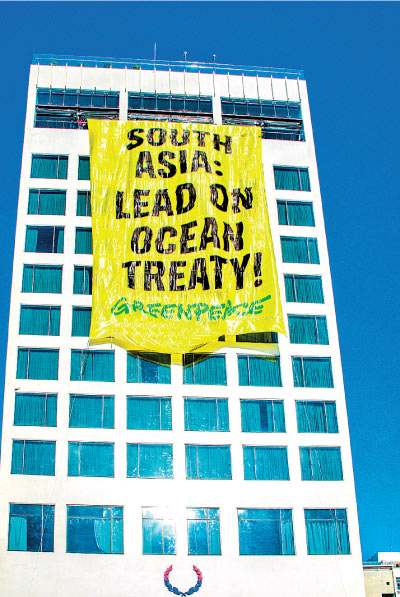Tuesday Feb 24, 2026
Tuesday Feb 24, 2026
Monday, 3 February 2025 04:34 - - {{hitsCtrl.values.hits}}
 Greenpeace South Asia yesterday delivered a strong message for Ocean protection on the eve of Sri Lanka’s National Day celebrations in Colombo, where regional States Leaders and representations will gather to honour the country’s Independence, declared on 4 February 1948.
Greenpeace South Asia yesterday delivered a strong message for Ocean protection on the eve of Sri Lanka’s National Day celebrations in Colombo, where regional States Leaders and representations will gather to honour the country’s Independence, declared on 4 February 1948.
A large banner reading “South Asia: Lead on Ocean Treaty !” was deployed on one of the prominent high-rise hotels in Colombo to welcome the positive steps by regional leadership in favour of the Global Ocean Treaty that will allow the creation of large scale sanctuaries on the High Seas.
In September 2024 at the UN General Assembly, both Bangladesh and The Maldives ratified this new Treaty — formally known as the Agreement on Biodiversity in Areas Beyond National Jurisdiction (BBNJ) — and India also confirmed its signature, when Nepal had signed the year before. To complete the picture, this last December, Sri Lanka in turn committed to sign and ratify the BBNJ Agreement.
Greenpeace South Asia Campaigner Anita Perera said: “By taking this step, the Bay of Bengal nations are demonstrating bold, forward-thinking leadership in protecting marine biodiversity on the High Seas and combating climate change. This commitment not only safeguards the livelihoods of their people today but also ensures a healthier, more sustainable future for generations to come.”
The Oceans cover 71 % of the Earth’s surface, they host most of the biodiversity and represent the largest carbon sink on the planet, and have so far absorbed more than 90% of the excess heat from human greenhouse gas emissions. Yet they are facing multiple threats, from overfishing, mining, pollution, acidification and record water warming, which further leads to coral bleaching, shifts in marine species distribution, sea ice loss, sea level rise and extreme weather events. As a result, their ability to cope and absorb as much carbon dioxide to keep pace with human emissions is being compromised, which can only exacerbate climate change impacts. In contrast, the global Ocean Treaty will facilitate the declaration of large protected areas over key marine ecosystems to support their resilience and achieve 30% protection of the High Seas by 2030.
Greenpeace South Asia Deputy Program Director Avinash Chanchal said: “The Oceans are critical for people’s livelihoods and food sovereignty, but also to mitigate the dire consequences of climate change and extreme weather crisis that have become the norm in South Asia and elsewhere: Cyclones, heat waves, droughts, floods and landslides to name a few. Now is the time to curb fossil fuel emissions and preserve our best climate ally, the Ocean.”
“In this period of celebration for Sri Lanka’s Independence Day, we are acknowledging all the recent efforts made by our Governments but also urging them to ensure the full ratification of the Global Ocean Treaty on time for the UN Ocean Conference in June 2025, in order to enable protection measures with effective impact in the short term,” added Anita Perera.